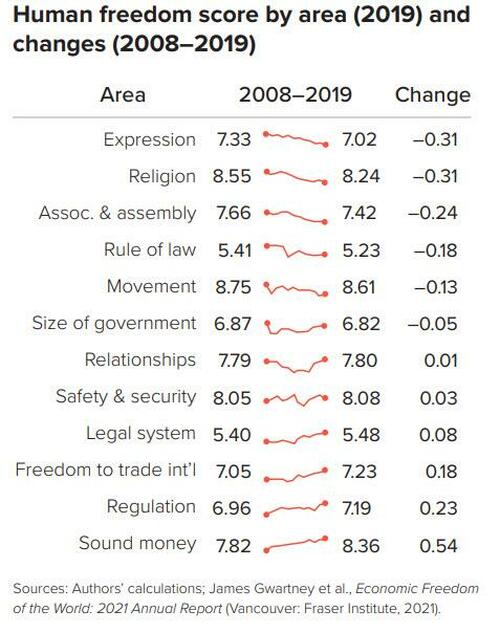Global Freedoms Hit ‘Dismal’ Record Low Amid Pandemic
The state of democracy worldwide fell to a record low in 2021, largely due to pandemic restrictions that have led to many nations placing a public health emergency of arguable severity over personal freedoms, according to a new report released Thursday which rated 167 countries based on various measures including civil liberties and electoral processes.
According to the London-based Economist Intelligence Unit (EIU), less than half the world’s population live under some form of democracy.
Overall, the world’s score fell to 5.28 out of 10, setting “another dismal record,” with the EIU’s lowest rating since they began the index in 2006, according to the Washington Post.
The annual decline was the largest since 2010, with the survey finding that just 6.4% of the world lived in a “full democracy” last year, while over 1/3 lied under authoritarian rule – with much of that coming from China.
The decline did not start with the pandemic, but it has compounded negative trends. From lockdowns to travel bans, the coronavirus led to “an unprecedented withdrawal of civil liberties among developed democracies and authoritarian regimes alike,” the report said. -WaPo
“It has led to the normalization of emergency powers, which have tended to stay on the statute books, and accustomed citizens to a huge extension of state power over large areas of public and personal life,” reads the report, which adds that the pandemic has exposed inequalities in health care, government mismanagement, and weaknesses in economic ‘safety nets.’
The pandemic has also opened the door for governments to exploit the health crisis in order to suppress political participation.
While North America remained the highest-ranked region in the EIU survey, Canada saw “a notable decline,” pushing the country out of the top 10, though it still scored highly, the report said.
Meanwhile, it noted that just about 10 percent of Canadians in a separate poll felt they had “a great deal” of freedom of choice and control, with “a worrying trend of disaffection among Canada’s citizens with traditional democratic institutions and increased levels of support for non-democratic alternatives.” -WaPo
In the United States – which received a “flawed democracy” rating from the EIU, “political and cultural divisions have become more entrenched,” despite Americans having become more engaged in politics in recent years due to “a series of high-impact events in 2020—including a politicized pandemic and a presidential election that the two main political parties framed in existential terms—boosted political engagement and participation.”
Topping the list of ‘full democracies’ are Norway, New Zealand and Finland. At the bottom are Afghanistan, Myanmar and North Korea.
Meanwhile, the 2021 Human Freedom Index from the Cato Institute and the Fraser Institute similarly found that freedom has declined for around 80% of the world, and that’s the ‘good news’ according to RealClear Policy.
The HFI, the broadest available freedom index, measures economic and personal freedoms, including security and the rule of law, both needed to protect the freedom of all and enable people to safely exercise their freedom.
The decline in freedom is wide-ranging. It affects countries large and small, dictatorships and democracies, and all regions of the planet. The freedoms that have declined most are speech, religion, and association and assembly. Yet there is a silver lining in these darkening skies.
In short, the decline in freedom worldwide is higher now than at any time in human history prior to the late 20th century, when the iron curtain fell.
Although in decline, freedom across the globe is higher now than at any time in human history prior to the late 20th century, when the iron curtain fell freeing hundreds of millions; African dictatorships gave way to elections; Latin America’s young democracies began opening their economies; Asian nations like Indonesia and the Philippines eased suppression; and China, home to more than a billion people, continued its liberalization. Most nations now backsliding are freer than they were two generations ago.
Yet today, much of the good news is bad. Look at the five nations where freedom most increased between 2008 and 2019: Myanmar, Sri Lanka, Tunisia, Ethiopia, and Armenia.
Myanmar and Tunisia have since suffered coups; Sri Lanka’s former leaders, accused of human rights crimes, have returned to power; Ethiopia has fallen into a gruesome civil war (after its newly elected prime minister Abiy Ahmed was awarded the Nobel Peace Prize in 2019), and Armenia lost a destabilizing war with Azerbaijan, which may have negative consequences for freedom internally.
The story is the same regionally. The Caucuses and Central Asia, South Asia, East Asia and Sub-Saharan Africa increased freedom between 2008 and 2019. However, gains in the Caucuses and Central Asia were driven by advances in freedom in Georgia where the president who led the freedom charge, Mikheil Saakashvili, is now under arrest in brutal conditions.
Many East Asian nations — Japan, South Korea, Taiwan, and Mongolia — had stable or rising levels of freedom. But most East Asians live in China, and the Chinese Communist Party has intensified its repression since 2019.
In South Asia — a vast region including countries such as Bangladesh, Bhutan, India, Pakistan, Nepal, and Sri Lanka — only Bhutan escaped growing repression since 2019. Sub-Saharan Africa suffers instability in the Horn of Africa and, in the Sahel, uprisings, coups, and growing Islamic insurgences. All of this will damage freedom going forward.
For full disclosure, both authors’ nations, the United States and Canada, have suffered comparatively smaller losses in freedom, though they face threats going forward. Government is growing rapidly in both nations, squeezing space for free exchange. Political polarization, particularly in the United States, will almost certainly continue to have negative consequences for freedom.
Reasons for freedom’s decline vary. In some cases, democratically elected leaders are aspiring autocrats, amplifying their power by suppressing opposition, speech, assembly, and even religion and relationship freedom, as in the Philippines, Turkey, Hungary, Mexico, and Poland. In other nations, autocratic leaders have intensified their attacks on freedom. Russia, China, Nicaragua, Egypt, and Venezuela are on this track.
* * *
And what’s suffered the largest drop? Freedom of speech.
We’re sure this will all go back to ‘normal’ once the pandemic is over, as authoritarians will surely cede the ’emergency’ powers they’ve granted themselves – right?
Tyler Durden
Fri, 02/11/2022 – 22:40
via ZeroHedge News https://ift.tt/uH321Jx Tyler Durden

